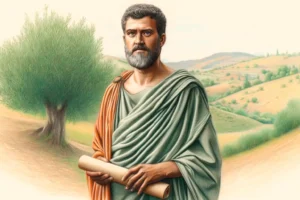
Barnabas, Early Christian Missionary Companion of Paul
Barnabas is a significant figure in the early Christian church, known for his missionary work and his close partnership with the Apostle Paul. His story is prominently featured in the Acts of the Apostles.
- Name and Meaning – Barnabas, originally named Joseph, was given the name Barnabas by the apostles, which means “son of encouragement” or “son of consolation” (Acts 4:36).
- Background – He was a Levite from Cyprus who converted to Christianity and played a pivotal role in the early church (Acts 4:36).
- Early Contributions – Barnabas sold a field he owned and gave the money to the apostles to support the Christian community in Jerusalem (Acts 4:37).
- Missionary Work – He was instrumental in bringing Paul to the apostles in Jerusalem when they were suspicious of Paul’s conversion. Later, Barnabas and Paul embarked on missionary journeys together, starting from Antioch (Acts 9:27, 13:2-4).
- Advocate for Gentile Converts – Barnabas was a key figure in supporting the inclusion of Gentiles into the Christian community, which was a major issue in the early church (Acts 11:22-26).
- Separation from Paul – Although Barnabas and Paul initially worked closely together, they had a sharp disagreement over whether to take John Mark with them on their second missionary journey, leading to their separation. Barnabas took Mark and went to Cyprus (Acts 15:36-41).
- Legacy – Despite less documentation of his later activities, Barnabas’s influence on early Christianity, particularly through his supportive and encouraging nature, left a lasting impact on the church’s development and outreach efforts.
Contextual Background
Barnabas emerges as a key figure in the Acts of the Apostles, where his activities are integral to the spread of Christianity in the first century. Originally named Joseph, he was a Levite from Cyprus who played a pivotal role in the early Christian community. His moniker, Barnabas, meaning “son of encouragement,” reflects his character and contributions to the church.
Theological Insights
- Generosity and Community Support
- Barnabas first appears in Acts 4:36-37, where he sells a piece of property and donates the proceeds to the apostles for the needs of the community. This act not only underscores his generosity but also his commitment to the communal life and welfare of the early Christians.
- Mediator and Mentor
- Barnabas played a crucial mediating role by vouching for the newly converted Saul (Paul) to the other apostles in Jerusalem, who were wary of Paul’s former persecution of Christians (Acts 9:27). His advocacy helped integrate Paul into the Christian community, setting the stage for Paul’s future missionary work.
- Missionary Initiatives
- Alongside Paul, Barnabas embarked on what is often called the First Missionary Journey, spreading the gospel across various cities in Asia Minor. Acts 13-14 detail their travels and challenges, including preaching the gospel, confronting sorcery, and facing persecution. Barnabas’s role in these missions was not just as a companion but as a co-leader.
- Advocacy for Gentile Inclusion
- Contention and Continued Ministry
- A significant test of character and partnership came when Barnabas and Paul disagreed over John Mark’s participation in their second journey. This disagreement led to their separation; Barnabas took Mark to Cyprus, demonstrating his forgiving and nurturing nature (Acts 15:36-41). Despite this separation, Barnabas continued his missionary work, emphasizing resilience and commitment to spreading the gospel.
Cultural and Historical Impact
- Mentorship and Leadership: Barnabas’s legacy as a leader is marked by his nurturing and encouraging disposition. His ability to see potential in others, as shown with John Mark, speaks to his mentorship, which has been a model for Christian leadership throughout the centuries.
- Model of Inclusivity: His advocacy for Gentile Christians has had a lasting impact on Christian theology and practice, emphasizing the universal scope of the Christian message.
- Artistic and Literary Influence: While not as frequently depicted in art and literature as Paul, Barnabas’s influence is noted in various Christian texts and teachings, often highlighting his role as a peacemaker and a person of integrity.
Conclusion
Barnabas’s contributions to early Christianity extend beyond his missionary journeys. His character, marked by encouragement, generosity, and advocacy for inclusivity, shaped the early Christian church’s trajectory. His interactions with Paul and other early Christians highlight the complexities and dynamics of early Christian ministry and leadership. His story enriches the biblical narrative, offering profound insights into the nature of Christian discipleship and community building.



